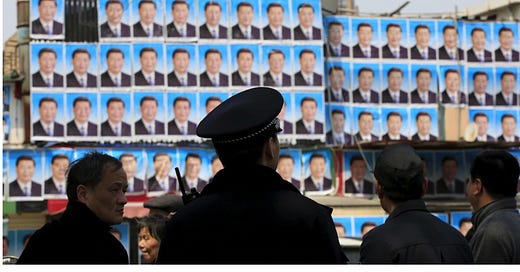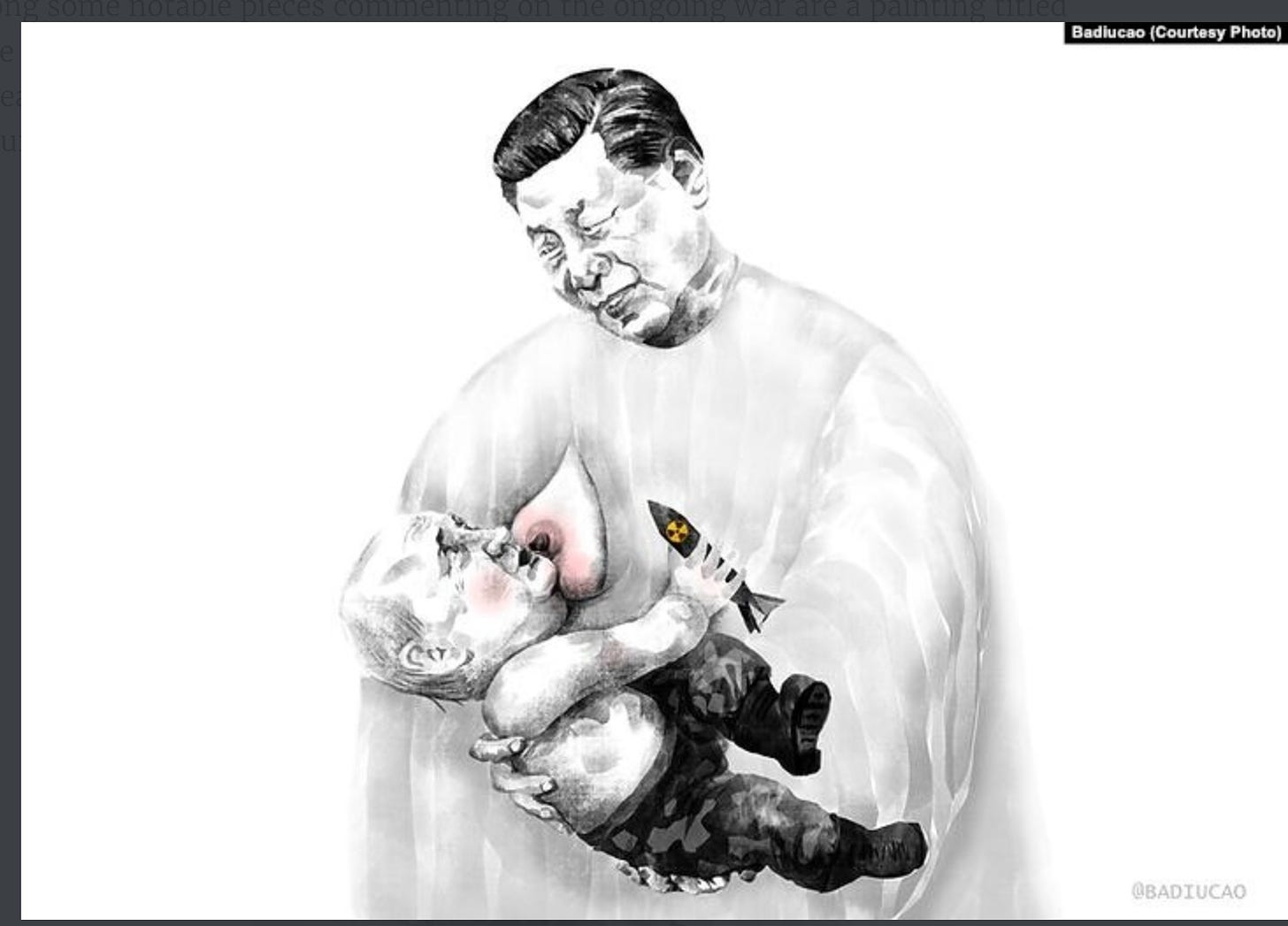Xi Jinping's Personality Cult Expands to Cover Up China's Failures
China's economic downturn could compromise its "authoritarian bargain" with Chinese.
"We want respect, not lies. We want reform, not a cultural revolution. We want a vote, not a leader. We want to be citizens, not slaves," read a banner placed on a bridge over Beijing's busy Third Ring Road. Such open acts of protest are rare in authoritarian China, which has developed one of the most sophisticated surveillance states in the world.
This protest, which coincided with the start of this week's 20th Communist Party Congress, was a direct hit at China's head of state, Xi Jinping. He should be stepping down after two terms but instead will start an unprecedented third five-year stint in office.
The expansion of Xi's personality cult has been crucial to his consolidation of power. It depicts him as an all-powerful and brutal leader in the tradition of Mao Zedong, whose Great Cultural Revolution (1966-1976) and other policies caused millions of deaths from famine, hard labor, and mass repression.
The banner's call for "reform" alludes to the governance model of Deng Xiaoping (1978-1989), who set up a system of collective leadership to preclude the abuses that come with the accumulation of power around a single person.
Xi's sharp turn away from any power-sharing arrangements is a rejection of Deng's legacy, and his self-elevation has caused discontent even within the party elite. The anonymous grassroots banner protest echoes in spirit a daring August 2021 open letter by three Communist Party notables, who warned that Xi's revival of a Mao-style personality cult could create the conditions for another Cultural Revolution-style "tragedy."
For those who study personality cults, such public reactions, while unusual in China, are predictable. Authoritarian states puff up personality cults for two main reasons. When they fear a destabilization of the social order due to an economic downturn and/or growing discontent, and when there are ongoing or planned domestic crackdowns and/or foreign aggressions. At such moments, illiberal states saturate the public sphere with images of the leader, so he will appear both omnipotent and omnipresent.
The inflation of Xi's cult and his concentration of personal power manifest the regime's worries that the slowing of Chinese economic growth and the distressing collapse of the real estate sector may compromise its "authoritarian bargain" with the middle class and elites: prosperity for them in return for tolerating heavy censorship and denial of freedoms.
The history of authoritarianism tells us that such situations often resolve with more repression at home and aggressive actions abroad, with the personality cult seeking to insulate the leader from criticism. And so it is in today's China, where state propaganda about the leader as a "man of the people" (a staple Communist and Fascist cult talking point) has accompanied an escalation of imperialist rhetoric about Taiwan (a sovereign territory the regime claims belongs to China). This includes threats of using force to achieve "reunification," and, at this congress, declarations that China's military will be expanded.
Not all of this is new. Xi has always energetically put down factions and any independent thinkers within the party, often with the excuse of acting against corruption and for "national rejuvenation" (both favorite despot strategies). The addition of "Xi Jinping Thought" to the Chinese constitution in 2018, which enshrined his political philosophy as state dogma, positioned him as the rightful heir of Mao (who had the infamous "Little Red Book" for his ideas). That led some foreign observers to caution against the "idolization of Xi and suppression of criticism against him."
Then, China's GDP was in expansion, bolstering Xi's claims of providing affluence and economic mobility to his people. Now, the economy is far weaker. Not only are property values declining, but one-third of property loans are considered bad debts, leading to citizen actions like mortgage boycotts.
No wonder China has delayed the release of its third quarter GDP news while the Party Congress is in session. Transparency would have made it easier to connect the dots between Xi's self-anointment as untouchable leader precisely when China's economic power is decreasing.
Yet state propaganda and repression cannot entirely cover up the situation. So what's an autocrat to do?
Turn to the old playbook of "national security," distracting Chinese from government incompetence by conjuring emergencies and enemies. Xi used the terms "security" or "safety" an incredible 89 times during his speech (vs. 55 times in 2017, when the economy was much stronger).
It's not surprising that the timeframe for acting against Taiwan has apparently been reduced. As Fascist dictators knew as well, what better way to unify the nation and take the focus off of the leader's mismanagement than a war?
As long as that war is carefully planned. Russia is on the minds of the Chinese, given how Putin botched the first gambit in their joint war against U.S. and global democracy. The Feb. 4 joint statement of Russia and China about multipolarity, and the two leaders’ meeting during the Beijing Winter Olympics, had advertised the pact: each country would support the other's unrestrained imperialism.
The failures of Putin's war against Ukraine and revelations of the corruption and weaknesses of its military may have made that relationship more burdensome, but China seems undeterred by global responses to Russian imperialism.
"It's Xi Jinping's party, everyone else is just living in it," remarks China expert Rana Mitter of Oxford. Yet Xi's internal crackdowns and dreams of omnipotence may put him in a similar position as Putin: devoid of proper input from experts who have the courage to tell him when he is taking a wrong step.
As megalomania takes over, as reflected in Xi's expanding personality cult, Taiwan could become Xi's Ukraine: a colossal mistake that reveals to the world the hollowness and corruption of authoritarian rule.






My God these are dark times. They all use the exact same playbook that has never worked for any kind of meaningful time and is so transparent. Yet, over and over again, we have these megalomaniacal tyrants who think they can take over the world. And unfortunately not holding Putin to account for war crimes against humanity is emboldening other terrible leaders such as Xi.
I fear that Chinese society is everyone's future. Not exactly the same in every country, of course — they'll all be authoritarian with social monitoring and no privacy, but some will be straight dictatorships, some will be corporatist states, some will clothe their government in the trappings of democracy....
I feel like the world I know is speeding toward a cliff, and no one knows how to stop it.